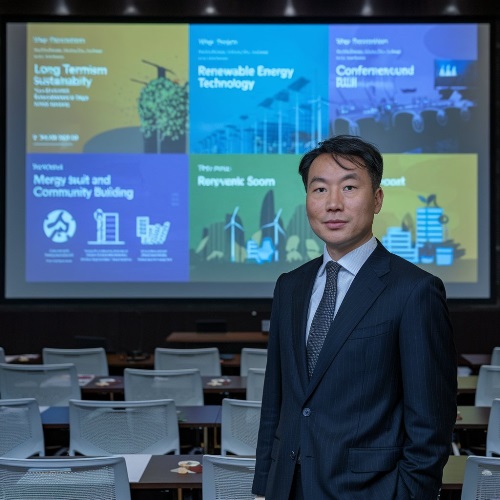
I. Introduction
Climate change and environmental degradation provide growing problems for the ASEAN region, which boasts diverse ecosystems and rapid economic expansion. The region's natural beauty is under threat, as are its economic stability and social well-being, due to the effects of increasing sea levels, harsh weather, and biodiversity loss. Asset managers show themselves to be effective change agents in this crucial environment. Their ability to control large sums of money gives them the power to either shift financial flows towards more resilient and environmentally friendly practices or they can use that power to continue unsustainable behaviours. In embracing ESG principles and driving revolutionary changes in the regional and global landscape, asset managers in ASEAN are positioned to lead the sustainability revolution, as this editorial examines.
Although there is a lot on the line, there are also tonnes of opportunities. Through their ability to drive innovation, change corporate culture, and create long-term value for investors and society, asset managers have the potential to stimulate sustainable development throughout ASEAN. It is possible to reduce risks, open up new markets, and establish the area as a leader in the worldwide sustainability movement by giving ESG factors top priority.
II. The Current Role of Asset Managers in ASEAN
Growing Adoption of ESG Principles
The application of ESG principles in asset management is expanding throughout the ASEAN region. In Southeast Asia, 79% of institutional investors include ESG considerations in their investment process, up from 67% in 2020, according to a 2023 BNP Paribas Asset Management poll. This trend is a result of increased investor, regulatory, and societal pressure, as well as a rising understanding of the financial materiality of ESG issues.
The agenda for sustainable investing in ASEAN is being driven by a number of projects and partnerships. To develop a regional taxonomy and encourage cross-border sustainable investment flows, the ASEAN Capital Markets Forum, for example, established a Sustainable Finance Working Group. By offering funding and assistance for projects pertaining to environmental, social, and governance (ESG), the Monetary Authority of Singapore (MAS) hopes to establish a thriving sustainable finance ecosystem.
Challenges and the Need for Deeper Engagement
Although there has been progress, problems still exist. Standardisation and data availability continue to be major obstacles. Asset managers are unable to make well-informed decisions due to a lack of consistent and comparable ESG data across industries and organisations. Concerns about "greenwashing," in which businesses inflate their sustainability credentials, can also damage investor confidence and impede the expansion of sustainable finance.
Asset managers need to actively support the sustainability objectives of the area and go beyond simple ESG integration. This include pushing for legislative reforms that support sustainability, interacting with investee companies to enhance their ESG performance, and creating novel financial products that direct funding towards environmental and social initiatives. Asset managers can hasten the shift of ASEAN into a low-carbon and inclusive economy by taking the lead.
III. Mobilizing Asset Managers for Regional Sustainability
Asset Allocation: A Catalyst for Change
The importance of asset allocation cannot be emphasised enough. Asset managers may hasten the shift to a sustainable future by effectively allocating resources. Greenhouse gas emissions can be greatly reduced and environmental protection can be advanced by redirecting investments from carbon-intensive industries to climate-friendly technology, renewable energy projects, and sustainable infrastructure.
The pledge made by a number of ASEAN sovereign wealth funds, including Temasek and GIC, to raise their exposure to sustainable investments is one excellent example. While Temasek wants to cut its portfolio's net carbon emissions in half by 2030, GIC has committed to investing S$10 billion on climate-related solutions over the next five years. These pledges show how sustainable investments are becoming more and more valued in the long run and have the ability to reduce risk.
Engagement and Proxy Voting: Influencing Corporate Behaviour
Additionally, asset managers can use their power as shareholders to persuade businesses to use sustainable practices. They are able to push for more robust ESG disclosures, approaches to managing climate risk, and board-level supervision of sustainability matters by actively participating in the process and casting proxy votes.
A recent example is the successful shareholder resolution that BlackRock and Vanguard, among other investors, filed to urge ExxonMobil to adopt more aggressive goals for cutting greenhouse gas emissions. This historic triumph highlights asset managers' increasing ability to promote company sustainability through active ownership.
Innovative Financial Products: Unlocking Green Capital
More money can be raised for sustainability projects through the creation of novel financial instruments. Impact investment funds, sustainability-linked loans, and green bonds are alluring options for investors to fund initiatives that have a positive impact on the environment and society.
Due to encouraging government regulations and high investor demand, the issuance of green bonds in the ASEAN region has increased dramatically in recent years. According to the Climate Bonds Initiative, ASEAN green bond issuance hit a record high of US$25.7 billion in 2022. The aforementioned trend underscores the increasing demand for sustainable investments and the possibility for asset managers to assume a crucial function in the expansion of green finance within the area.
IV. Addressing the Investment Gap and Ensuring Efficiency
Bridging the Investment Chasm
Even with the increasing momentum, ASEAN still has a huge investment gap in sustainable infrastructure and climate technology. According to the Asian Development Bank, until 2030, the region will require an annual infrastructure investment of US$210 billion in order to combat climate change, end poverty, and sustain its current rate of growth. Present contributions, however, fall well short of this goal, creating a large funding gap that needs to be filled.
With their knowledge of capital allocation and risk assessment, asset managers may be extremely helpful in securing funding for sustainable infrastructure and climate solutions. Working together with governments and development banks can help lower investment risk, draw in private money, and hasten the rollout of infrastructure and clean technology initiatives.
Specialized Funds and Investment Vehicles
The creation of niche funds and investment vehicles devoted to climate solutions can offer investors tailored chances to aid in the shift to a low-carbon economy. By concentrating on particular industries, such sustainable agriculture, energy efficiency, or renewable energy, these funds allow investors to match their portfolios to their sustainability objectives.
For instance, HSBC Global Asset Management's Asia Climate Solutions Fund seeks to invest in businesses that address Asia's climate change concerns. Targeting a variety of industries, such as sustainable transportation, clean energy, and water management, the fund shows how asset managers may spur innovation and effect by implementing specialised investment techniques with a climate focus.
Technology and Data Analytics: Identifying Opportunities
Asset managers may find and fund innovative climate tech projects by utilising technology and data analytics. Through the utilisation of artificial intelligence, machine learning, and big data, they are able to evaluate the social and environmental effects of investments, monitor the advancement of sustainability objectives, and make more knowledgeable investment choices.
This process is being made easier by the rise of ESG data providers and rating agencies, which give asset managers important information on how well projects and businesses are performing in terms of sustainability. Asset managers may create value for investors and contribute to a sustainable future by identifying possible winners and losers in the shift to a low-carbon economy by including ESG data into their investment strategy.
The Role of Family Offices and Impact Investment
The ASEAN sustainability revolution is also being significantly aided by family offices and impact investment portfolios. These investors are well-positioned to fund creative solutions to climate change and sustainable endeavours because they have a long investment horizon and are focused on producing both financial returns and beneficial social and environmental impact.
Early-stage climate tech firms and initiatives that may not yet be appealing to traditional investors might benefit greatly from the charitable deployment of cash by family offices and impact investors. This capital can serve as critical seed investment and catalytic capital. These investors have the potential to expedite the shift towards a sustainable future and bring about enduring good change by filling the financial gap and assisting in the creation of scalable solutions.
V. Creating Indicators for Regional Governments
The Importance of Transparent and Measurable Sustainability Indicators
Measurable and transparent sustainability indicators are essential for monitoring development, guaranteeing responsibility, and guiding wise policy decisions. They give governments, investors, and businesses a consistent vocabulary to evaluate ESG performance, allowing them to evaluate its effects, pinpoint areas for development, and make well-informed decisions.
Standardised sustainability indicators help speed up the transition to a sustainable future, encourage comparability across markets, and improve regional collaboration within the ASEAN area. Governments may encourage sustainable investments, measure their progress towards national and regional sustainability goals, and track business sustainability performance by setting clear standards and targets.
Asset Managers as Catalysts for Change
Asset managers can be extremely important in creating and supporting standardised sustainability metrics because of their in-depth knowledge of ESG concerns and proficiency with data analysis. They can aid in the development of strong frameworks that encompass the important ESG concerns pertinent to the ASEAN area by working with governments, trade associations, and other stakeholders.
Providing governments with access to data and insights can improve policymaking even more. Asset managers have access to important information that can help guide regulatory frameworks and encourage evidence-based decision-making because of their interactions with investee firms and their analysis of ESG risks and possibilities.
Constructive communication with legislators is also crucial. Asset managers have the capacity to lobby for laws that support sustainability, encourage openness, and make it easier for money to flow to social and environmental projects. They may influence the regulatory environment and help create a supportive atmosphere for sustainable finance by actively engaging in the policymaking process.
Transcending Geographic/National Boundaries
Sustainability indicators must go beyond national and physical borders due to the interconnection of global issues like climate change and biodiversity loss. Indicators must be aligned with global frameworks and standards in order to assure comparability, promote cross-border investments, and encourage collaborative action towards the Sustainable Development Goals, even while national and regional contexts are important.
With their extensive international network and knowledge, asset managers may be extremely helpful in advancing the convergence and harmonisation of sustainability metrics between national boundaries. They can aid in the creation of a global vocabulary on sustainability that promotes responsibility, openness, and efficient action in the direction of a sustainable future for all by promoting international cooperation and exchanging best practices.
VI. The Future Role of Asset Managers and ASEAN's Opportunity
Asset Managers: Key Partners in ASEAN's Sustainable Future
As ASEAN's sustainable future takes shape, asset managers will likely play an even more significant role in the years to come. As the region moves towards a low-carbon economy, they will be crucial allies in raising money for energy-efficient projects, sustainable infrastructure, renewable energy, and other climate-related initiatives.
Asset managers will use their clout as pioneers in the advancement of corporate governance and sustainable business practices to move industries towards betterment. They will incentivise businesses to embrace ethical environmental and social practices, improve transparency, and make a positive impact on a more inclusive and equitable society by means of active engagement, proxy voting, and cooperative projects.
Rich in innovation and promise, the climate tech industry will find vital partners and development drivers in asset managers. Asset managers have the power to expedite the creation and implementation of innovative solutions that tackle climate concerns and promote sustainable development by spotting and endorsing potential initiatives, offering patient financing, and cultivating a supportive ecosystem.
Educating and Advocating for Long-Term-ism
Asset managers have a crucial responsibility to educate investors and the general public about the significance of long-term sustainable investing in addition to their immediate actions. They can help to create a culture of long-termism that values sustained results and impact by highlighting the financial materiality of ESG factors, highlighting the potential for sustainable investments to create long-term value, and supporting policies that facilitate a just transition.
ASEAN's Opportunity: Leveraging Asset Managers' Expertise
ASEAN is at a turning point. The decisions taken today will shape the future course of the area for many years to come. ASEAN can accomplish its sustainability goals, quicken climate investment, and establish itself as a global leader in the shift to an inclusive, low-carbon economy by identifying and utilising the skills of asset managers.
The potential is obvious: asset managers and ASEAN can create a strong alliance that opens doors to a more promising and resilient future for the area and its citizens via cooperation, innovation, and a common commitment to sustainability. Now is the moment to take action.
VII. Conclusion: A Call to Action
Bold action and revolutionary leadership are required due to the urgency of the climate issue and the need for sustainable development. Asset managers are leading this crucial effort with their financial expertise and clout. It is an appeal for them to take on the role of advocates for sustainability and change agents.
Collaboration is essential. To accelerate the shift to a low-carbon and inclusive economy and promote systemic change, asset managers must establish strong partnerships with governments, regulators, enterprises, and civil society organisations. Through collaboration, knowledge exchange, and resource sharing, they can increase their influence and produce significant outcomes.
There is enormous potential for ASEAN to lead the world in sustainable finance. The region offers a singular chance to highlight creative solutions and spur international action because of its abundant biodiversity, susceptibility to climate change, and rapid economic expansion. Realising this vision can be greatly aided by asset managers' strategic investments, interactions with businesses, and support of sustainable legislation.
Asset managers may help to create a more promising and sustainable future for the globe and ASEAN by actively assuming this role. This is the time to act decisively. Let's take advantage of this opportunity and collaborate to create a robust, just, and prosperous future for all.
Posted 20/09/2024

















7 months ago
আমাকে একটা টিকটক বানিয়ে দেন